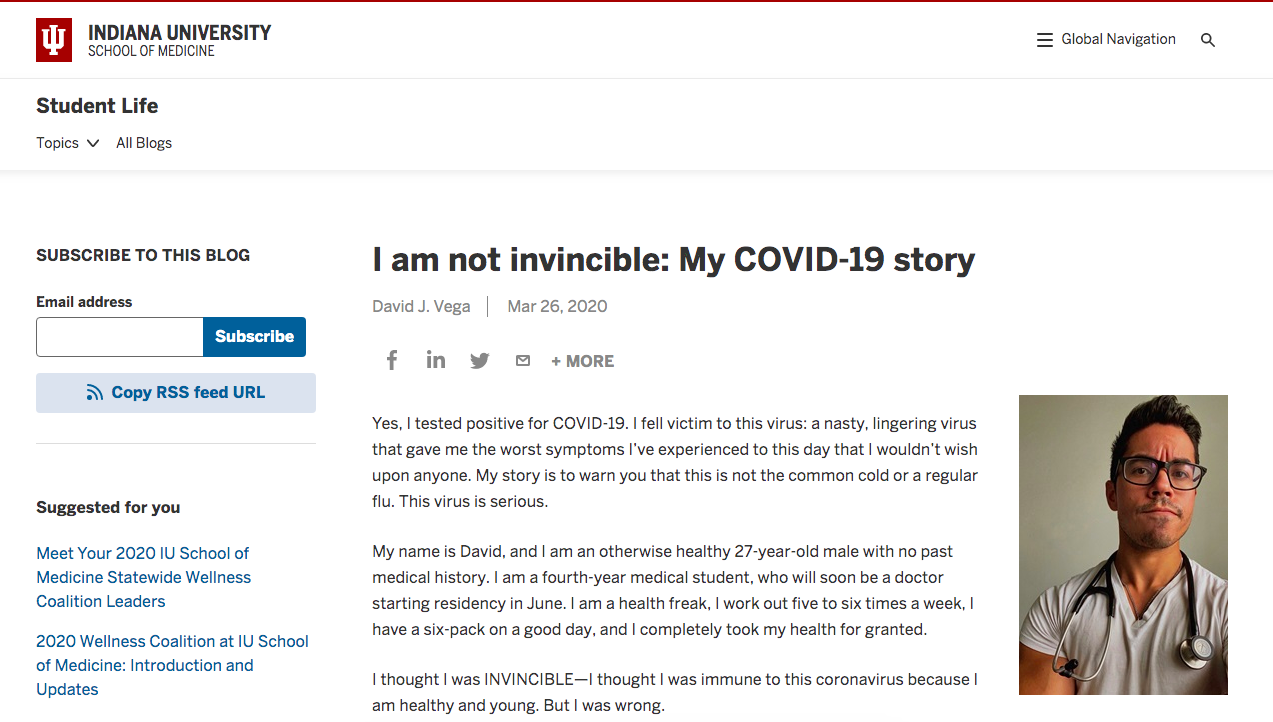3 Tips for Handling a National Crisis – From a Blogging Perspective

During a national crisis, blogging can become a bit of a minefield. How do you know what topics are appropriate and which are taboo? Should you approach the crisis head-on or stay in your lane?
As of now, more than 1.6 million people have been infected with the coronavirus around the world. Businesses, schools, hospitals, and others have been dramatically impacted, leaving people without jobs and with disrupted lives.
We’re going to give you some advice on how to address a national crisis without stepping on toes or straying from your field of relevance. Pay close attention to the next three tips – they could make or break your reputation during the coming months.
- Discuss How the Crisis Pertains to Your Industry

Image Source: Indiana University School of Medicine
Jumping right in, the number one strategy is typically to discuss the national crisis from your perspective. How is it affecting your industry, your colleagues, or even your personal life?
For instance, look at this personal documentation of a young medical student’s experience with COVID-19. Not only does it come from a unique perspective, but it gives new insight as to how medical students are dealing with the virus.
People are getting enough information about COVID-19 from national news outlets. They don’t need bloggers and individuals to provide more of that – instead, they need to see different perspectives, stories, and industry information.
Another great example comes from small business supporter Jordan Lee Dooley. She gave her audience a peek into how SMBs she knows are struggling and dealing with COVID-19.

Image Source: Jordan Lee Dooley
Rather than just posting another article about the symptoms of coronavirus or how she’s spending her days in quarantine, Dooley made the smart move and educated people about what she’s been seeing in her neck of the woods with small business clients.
Take a look at your own industry. It could be medical, healthcare-related, technology-based, or something entirely different. Everyone is affected by COVID-19 in some way – as a blogger, this is your chance to show how the crisis affects you personally, as well as your field.
- Share Facts, Not Rumors
It’s no secret that there’s been a fair amount of “fake news” when it comes to the spread of the coronavirus over the past few months. News sources have been keeping running lists of the hoaxes spreading, as well as misinformation and clickbait.
As a blogger, you have a choice during a national crisis: to be a part of the information problem or a solution to it.

Image Source: Trusted Health
Trusted Health, a technology company that connects travel nurses with jobs, has been using its blog as a platform for halting bad COVID-19 information. It has hosted Q&As with experts, given data-based advice to nurses, and generally worked against fake news.
Obviously, your blog might not be as involved in the healthcare industry as Trusted Health, and therefore might not need to do as much. However, that doesn’t diminish your responsibility as a blogger to promote valid, helpful information instead of unfounded rumors.
- Avoid Taking Advantage of Tragedy
If you want to see your followers turn on you in an instant, you’ll use a national crisis as a way to market yourself and achieve financial success.
People are dying. Families are being divided. Businesses are closed and the unemployment rate has skyrocketed. These are trying times, and as a blogger, you need to be incredibly sensitive to the pain and uncertainty that many are facing.
Rather than trying to blatantly advertise your product and promote yourself, lean on providing advice and support to those in need. Sure, that can come from your services and brand, but you need to present your aid in a tactful manner.

Image Source: Lyft
Take a look at Lyft, the rideshare company. Although they easily could have taken an advertorial standpoint and encouraged essential workers to use their services, they took a different approach. The company openly discusses how they are delivering medical goods, meals, and other critical products to people.
Obviously, this isn’t totally out of the goodness of the brand’s heart – it’s also a marketing tactic to present itself as a charitable brand to support. However, that doesn’t diminish the good they are doing for others during these challenging times.
How is your brand handling COVID-19? Are you responding in a supportive, positive way? If so, highlight that on your blog. Show people that you aren’t just taking advantage of customers but supporting them through their ups and downs.
That’s a great way to build a trustworthy blog that people continue to read after all of this has come to an end.

Image Source: cPanel
Even if you’re not going above and beyond with charitable work, your blog can serve as a platform for spreading positive messages, like cPanel has done.
Explain how your business is bringing communities together and supporting individuals. When this national crisis finally comes to an end, consumers will remember the blogs that spread positive news – not panic and selfishness.
Here’s What NOT to Do
As a bonus after our three tips, we want to give you three “don’ts” to take to heart. These are all tactics that we’ve seen bloggers use in the past – and they’ve been criticized highly for it.
Don’t Make Light of the Situation
As you already know, for millions of people around the world, COVID-19 is a serious threat. It’s impacted jobs, health, the economy, and happiness. Even if you haven’t been impacted directly, you likely know someone else who has been.

Image Source: MTV
Whatever you do, don’t follow in Vanessa Hudgens’ footsteps. She released a video stating that she thought the quarantine until summer was unnecessary and that people dying was somewhat inevitable, so why did we need to self-isolate?
Needless to say, her followers immediately pointed out the insensitivity of her comments. The actress made a profuse apology online, but her reputation is still a little tarnished.
As a blogger, you could easily voice opinions that make light of the situation or come across as ignorant to those who have been impacted. Double-check every topic and post to ensure that you are being tactful, as well as considerate.
Don’t Point Fingers
When tragedy strikes, we all want to find someone to blame. However, now isn’t the time to do that – especially on your brand’s blog.
Don’t point fingers at other nations, politicians, or even your neighbors. Instead, use your platform to lift others up and provide a positive source of education and support. We guarantee pointing fingers won’t take you as far as sharing encouragement.
Don’t Publish Clickbait
Last but not least, don’t, and we repeat DON’T, share clickbait headlines. People are getting enough panic in their inboxes and news feeds as it is. They don’t need your blog chiming in with dramatic, vague blog posts that aren’t upfront.

Image Source: Accuracy in Media
News outlets, influencers, and bloggers are all being called out for posting clickbait titles. Now is not the time to tempt people to click on your post with salacious, questionable headlines. Instead, take a more straightforward approach.
In Conclusion
We’re living in unprecedented times, and that means bloggers are dealing with unprecedented circumstances. However, that doesn’t mean we don’t know how to handle them.
Blogging during a national crisis should be centered around facts, positivity, and encouragement. Share your story and the stories of those around you. Pass on science-based information instead of exciting concepts and rumors. Don’t take advantage of the tragedy, but be a light in it.
Your readers will thank you for it.
AUTHOR BIO
Riley Swanson is a full-time writer at E2M Solutions Inc. who specializes in producing engaging blogs, feature pieces, and website content. When she’s not cranking out text, which is rare, she’s spending time with her husband and traveling the world. She’s addicted to murder podcasts, fantasy novels, and chocolate-chip cookies

